NEWS
Breast cancer study session attended by Nadeshiko Japan coaching staff
27 October 2022
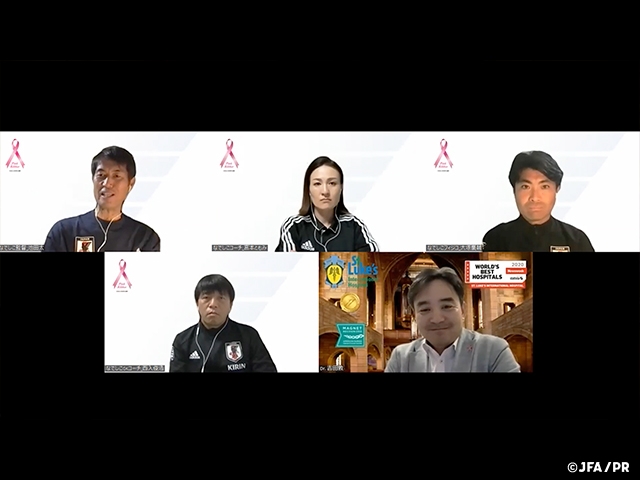
On Tuesday 18 October, Japan Football Association (JFA) organised an online breast cancer study session, attended by Nadeshiko Japan (Japan Women's National Team) coaching staff, in cooperation with the Pink Ribbon Festival (organised by the Japan Cancer Society and others). Since 2019, JFA has been involved in various activities held in October, which is known as the “Pink Ribbon Month,” in efforts to raise awareness of the Pink Ribbon Movement. As part of this initiative, a breast cancer study session was held for the Nadeshiko Japan coaching staff to provide an opportunity for men to understand breast cancer and its effect on women's health, as well as to discuss points that need to be taken care of when coaching female athletes.
【Lecturer】
Dr. YOSHIDA Atsushi (Medical Director of Breast Surgery at St. Luke's International Hospital)
【Nadeshiko Japan Coaching Staff】
Head Coach: IKEDA Futoshi
Assistant Coach: MIYAMOTO Tomomi
GK Coach: NISHIIRI Toshihiro
Physical Coach: OTSUKA Keisuke
Cancer is often referred to as “cells that do not die”
――Today we will learn about breast cancer. Coach Ikeda, how much do you know about breast cancer?
IKEDA What I do know is that it is one of the leading causes of cancer deaths among women, that early detection is important, and although it is rare, men can also develop it, but I do not know much more about it.
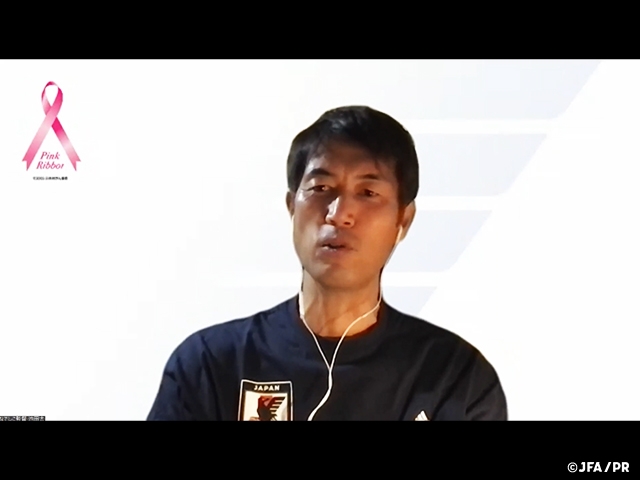
――How about Coach Miyamoto, the only female participant of this session?
MIYAMOTO I have people around me who have breast cancer, and I myself have been getting regular check-ups since I turned 30 years old. It is one of the cancers that I am very familiar with.
――We would like to ask Coach Miyamoto about her own experiences later on, but let's start by listening to Dr. Yoshida's lecture.
YOSHIDA Thank you very much for your time. I have prepared five questions for you. The first question is: "What is cancer?" What do you think, Coach Ikeda?
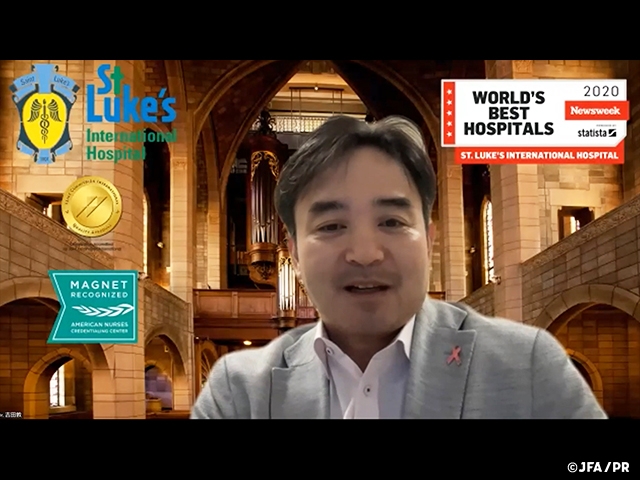
IKEDA A collection of cells that are not normal?
YOSHIDA Right. They are often referred to as “cells that do not die.” Normal cells have a lifespan and maintain their normal state through selection, but when a genetic error occurs that prevents them from dying, they become cancer cells. Malignant transformation of epithelial cells at the boundary between the inner and outer body is called “cancer.” This occurs in the pathways of food and other substances, such as oesophagus, stomach, colon and lung. On the other hand, cancers that form in bones and soft tissues are called “sarcomas.” Compared to cancer, sarcomas are extremely rare and difficult to cure. There is also “leukaemia,” which is a cancer of the blood. These are the three main categories.
IKEDA It makes it easy to understand when you say that cancer can form in the pathways of food and other substances.
YOSHIDA Thank you. A simple explanation of the mechanism is that normal tissue can be damaged by food, daily routines, infection or ultraviolet radiation. Normally, our bodies have a system to heal themselves from such errors, but when this system fails or is underpowered, errors will accumulate to cause cancer.
Many people are affected by breast cancer. Differences in trends between Asia and Western countries
YOSHIDA Here we will take a look at the case of breast cancer. The breast is made up of milk-producing lobules and ducts that connect them to the nipple. Breast cancer is a malignant transformation of the ductal epithelium, a cell type found in the ducts of the breast. Our next question is: "How many people develop breast cancer?" What do you think, Coach Nishiri?
NISHIIRI Is it about 30 percent?
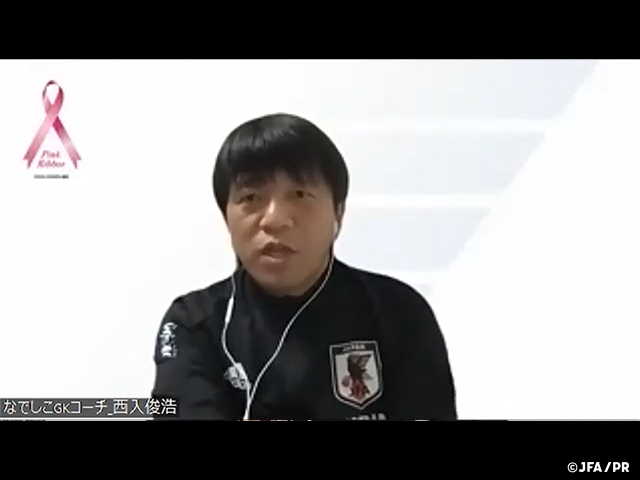
YOSHIDA Not that many, but you are right in the sense that many people are affected by it. In terms of number of patients, it is the leading cancer among women. It is a type of cancer that is relatively easy-to-find and is detected at an early stage by a large number of people, making it the fourth most common cause of death. Nearly 100,000 Japanese women are affected each year. It is estimated that one in 12-13 Japanese women will experience breast cancer in her lifetime. In terms of age, the peak is seen in the late 40s and early 50s, with the next peak seen in the 60s. It is rare for young people to develop breast cancer, and the incidence of breast cancer among Japanese women gradually increases from the late 30s onwards. Men can also get breast cancer, but mainly in older ages.
On the other hand, Westerners are about three times more likely to develop breast cancer than Asians, and the number increases with age. It is believed to be due to differences in body shape, diet and genes, but it is possible that these figures in Japan will come closer to those in the Western countries in the future. We also know that more than 80% of those diagnosed with breast cancer are alive and well five years later.
NISHIIRI These figures give us a realistic picture or the current situation. It is interesting to learn about the differences between Asians and Westerners and the possibility that the Japanese people could also become follow the trends of the Western countries.
YOSHIDA Thank you. Now on to the next question, "Should I get checked for breast cancer?" Coach Otsuka, what do you think?
OTSUKA I think it is better to do so.
YOSHIDA Yes, it is. But why should we do so?
OTSUKA For early detection and regular inspection for anomalies?
YOSHIDA Excellent answer. You want early detection, and you don't want to have to go through the pain of cancer. There are various types of breast cancer screening, but the most common method is called “mammography.” Breasts are pressed down on an acrylic plate to take x-rays, but not all lesions are visible, and it can be difficult to see where the disease is located. Especially for young women, the contrast between the cancerous lumps and the normal mammary glands captured on mammography can be difficult to detect, as the mammary glands are rigid and not fully developed at a young age. The pain during the examination also tends to be greater for those with rigid mammary glands. On the other hand, there is also ultrasound examination. While ultrasound makes it easier to detect lumps, it also shows benign lumps and other physiological changes that are not cancerous and require other tests to determine whether they are malignant or not, which can be a challenge.
What is Breast Awareness?
YOSHIDA Generally, there are two types of screening methods: “Organised screening” and “Opportunistic screening.” Organised screening is carried out by local authorities and its main purpose is to reduce the number of people dying from breast cancer from the whole population. Opportunistic screening, on the other hand, is a medical examination which aims to reduce the risk of the individuals. Breast cancer screening is considered beneficial and recommended to everyone. It is very accurate and likely to detect cancer because it examines the superficial layers of the body, which are easier to examine compared to other parts of the body. Large scale studies have also shown that people over 40 years of age who undergo mammography are less likely to die from breast cancer. For women, there is also cervical cancer screening, which is also highly accurate and said to be very beneficial.
However, while breast cancer screening has the advantage of reducing mortality, it also has its disadvantages. The first one is exposure to radiation. The amount is so small that it should not be considered an issue, but exposure to radiation at a young age can lead to future cancer, so there is no need to undergo screening if it is not necessary. In addition, breast cancer screening for women in their 20s and 30s rarely detects cancer, but instead finds many benign diseases. When found, a decision has to be made as to whether or not it is cancerous, so there is a risk of having to undergo histological and cytological examinations, which may be totally unnecessary. There is a medical and economic loss when people who do not have cancer are screened, which may prevent the opportunities for those who really need to be screened.
Not to mention the emotional toll it takes on a person when they find out they may have cancer. It has been reported that it is more emotionally taxing to receive notification that “you may have cancer” than to be told that “you have breast cancer,” with nearly 70 percent of those notified experiencing depressive feelings. For example, if 10,000 people are screened with mammograms, about 6-7% will be asked to be re-screened. Out of the 600-700 people who are re-screened, only 23 will actually be diagnosed with breast cancer. The rest will experience a sense of uncertainty, even though they are cancer-free.
When undergoing cancer screening, you need to know your risk first. For example, those with one or more family member who has had breast cancer may benefit greatly from the screening and, in general, are more susceptible to cancer as they get older. As mentioned earlier, there are disadvantages as well as advantages to screening, so you need to evaluate the “Net-Benefit” by yourself and make a choice whether or not to undergo screening. Now, the next question is: “What is Breast Awareness?” Coach Miyamoto, have you ever heard of this term?
MIYAMOTO I have never heard of it.
YOSHIDA This is a term used to encourage women to be aware of the condition of their breasts on a daily basis. Unlike self-examination, the idea is that, in the course of our lives, we should be aware of any changes in our breasts, just as we are aware of any changes in our face or body. There are four key points to Breast Awareness. “Know your breast condition,” “be aware of any changes,” “consult your doctor as soon as you notice any changes,” and “get a breast cancer screening once you are in your 40s.” We have to incorporate these in our daily lives.
MIYAMOTO Come to think of it, there are posters in public baths and other places.
YOSHIDA If you notice any changes, lumps, dips or pain in your breast, go to a trusted doctor as soon as possible. And, once you turn 40, get screened every two years. These are important actions to reduce the risk of dying from breast cancer. The Ministry of Health, Labour and Welfare and the Tokyo Metropolitan Government are also making efforts to raise awareness, but only 4.8% of the general public is aware of this initiative. We would like to spread the word and let everyone know about breast awareness.
Prevent cancer with proper medical knowledge
YOSHIDA The last question is: “What is hereditary breast cancer?” Coach Ikeda, what do you know about it?
IKEDA We hear how cancers run in families and that some cancers can be hereditary, but I have no knowledge of hereditary breast cancer.
YOSHIDA Hereditary breast cancer is a type of cancer that affects people who are born with a mutation in the tumour suppressor gene, which repairs damaged genes. They result directly from gene mutations passed on from a parent. Genes called “BRCA1” and “BRCA2” are tumour suppressor genes associated with breast cancer, and people from families in which these genes do not function properly are more susceptible to breast and ovarian cancer than the general population.
In Japan, the BRCA test, which tests for mutations in this gene, was finally covered by insurance in April 2020. However, the test is not available to everyone and is restricted to patients who have developed breast or ovarian cancer. Tests are taken so that a person who has developed cancer can prevent developing additional breast cancer.
BRCA mutations are not uncommon, and it is thought that this mutation is found in approximately 1 in 500 people of the general Japanese population. It is also estimated that approximately 1 in 25 people who develop breast cancer may be affected by this genetic mutation. We want people to have this kind of health literacy, proper medical knowledge, and to incorporate them to prevent diseases.
――Dr. Yoshida, thank you very much, Coach Ikeda, did you find out anything new today?
IKEDA I learned about the current situation of breast cancer and gained many new information. I have a question. In the case of lung cancer, for example, there are preventive measures such as not smoking cigarettes, but what can we do to prevent breast cancer?
YOSHIDA Research has been conducted on what lifestyle habits predispose people to breast cancer, but there aren't any real examples of how to prevent them. However, we do know that gaining weight after menopause clearly increases the risk of developing breast cancer. This overlaps with other health maintenance activities but exercising and watching one's diet can help prevent breast cancer. Smoking and drinking should also be avoided.
IKEDA Thank you very much.
Menstruation, pregnancy, childbirth... it's important to know about women's bodies
――From here, I would like to talk about what the Nadeshiko Japan coaching staff, who are usually in charge of coaching female athletes, are concerned about in terms of coaching. Coach Miyamoto, as a former player yourself, were there any health issues that affected you during your playing days?
MIYAMOTO In terms of something specific to women, it is menstruation. For me, it was relatively mild, and I didn't have to worry about it that much, so I just took painkillers, but I had teammates who had severe menstrual pain, and some who suffered from endometriosis. I also resumed training about seven months after giving birth, but because I was playing while breastfeeding, I suffered a stress fracture to the pubic bone due to calcium deficiency.
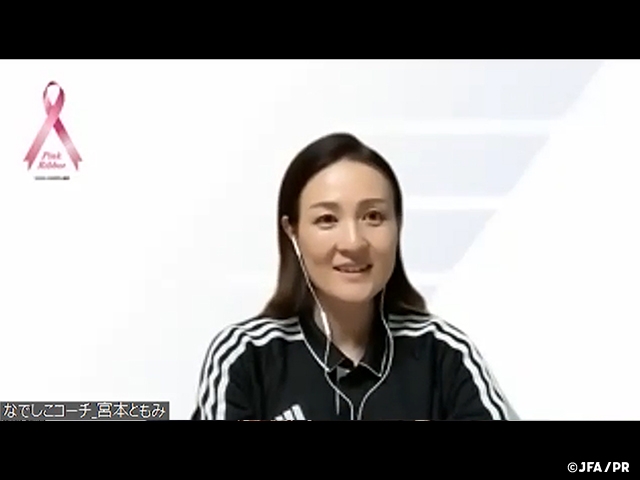
――You have been through a lot yourself, and you had teammates who were also struggling.
MIYAMOTO Menstrual pain varies from person to person, so I think it is difficult to understand what they are going through, and many players had to deal with it individually in various ways, such as taking the pill. More and more players are going through childbirth these days, so I hope I can use my own experience to help them.
――Thank you very much. Coach Otsuka, this is your first time coaching a women's team. Are there any changes you have made in your approach, as you focus on “building the body,” compared to coaching a men's team?
OTSUKA I became in charge of the women's team last year, and it was not until I started coaching that I realised that athletic amenorrhoea caused by lack of available energy in the developing age, and osteoporosis derived from it, are much more serious issues than I had thought. Rather than having female coaches having to address the general public and the coaches, I think health literacy is something that male coaches and the physical coaches, like myself, have to get involved with, and be knowledgeable about, so that we can educate other male coaches, parents and the athletes themselves.
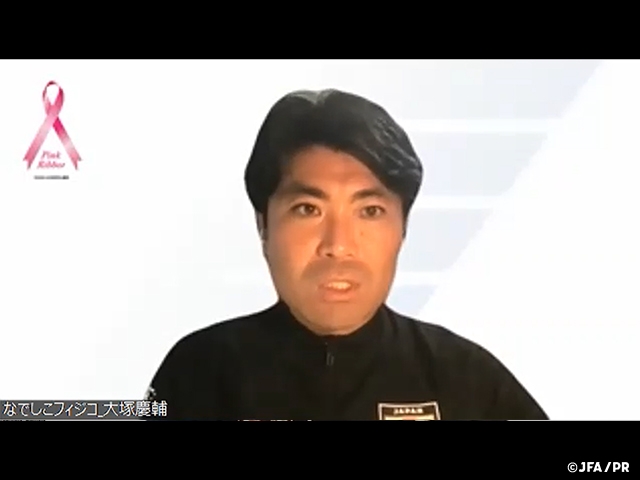
――On the other hand, Coach Nishiiri has been involved in women's coaching for a long time, starting with the Japan Women's Universiade National Team in 2005. What are your impressions from watching the different categories?
NISHIIRI Listening to Dr. Yoshida, I was reminded that, as a coach, it is important to have a good understanding of women's bodies and how they work. There are things that need to be approached according to the age group, such as menstruation and anaemia in the developmental years, and the coaches need to understand and communicate to the players about breast cancer and issues that are common amongst top athletes. It is necessary for coaches to exchange information with each other, understand it correctly and share it with those involved in training and strengthening the players.
Men and women working together to build a team
NISHIIRI I also have a question for Dr. Yoshida. You mentioned that the incidence of breast cancer in Japan is becoming more westernised, but is the number of breast cancer cases increasing in younger age groups?
YOSHIDA There are cases of breast cancer in women in their 20s and 30s, but these are rare. Therefore, internationally, breast cancer screening at a young age is not considered to be beneficial. Although breast cancer is a possibility when there is discomfort, it is more likely to be a benign lump. If you undergo breast cancer screening in this situation, you may receive a “suspected cancer” notice and have to go through further tests, even though you do not have cancer, so if you feel any discomfort, it is important to visit a clinic with a reliable breast specialist to assess the situation. However, those with family members who have had breast cancer may want to be careful.
OTSUKA In relation to what you have just said, let me ask you a question as well. If you have a trusted breast specialist, would it be a good idea to get yourself checked at a young age so that you are aware of your situation and then proceed with breast awareness at a daily basis?
YOSHIDA Basically, unless you feel any discomfort, young women are all healthy and it is rare for women in their 20s and 30s to develop breast cancer, so if you don't feel any discomfort, there is nothing to be concerned about. If there is a difference between the two sides, or if there is something that was not there before, it is a good idea to see the doctor to find out what it is.
――Thank you very much. Finally, Coach Ikeda, what do you keep in mind when coaching a women's team?
IKEDA On the pitch, we are always on the lookout for changes in the players, and with the help of the female staff and medical staff, we try to create an environment and atmosphere where players feel comfortable talking to us when they have a problem.
――You seem to be mindful of the way you communicate with the players as well, but do you think it helps to have female staff such as Coach Miyamoto?
IKEDA Yes, that's right. I try to communicate in a natural manner myself, but sometimes Coach Miyamoto will share the details with the team, and the female coaches are the ones who can enter the dressing room right away, so they help me in that area while we work together as a team.
YOSHIDA It is truly a team building experience. The breast surgery department at St. Luke's International Hospital, where I work, is staffed by mostly women, including the director, making it easy for them to discuss issues such as marriage, pregnancy, childbirth and menstruation. I'm the only male, so it's kind of the opposite situation where people around me care about my wellbeing, but I thought it was really nice that the staff, which is mainly male, are looking out for the female players.
――Thank you very much. That concludes our discussion. Once again, Dr. Yoshida, thank you very much.
Latest News
-
Coaches
2024/12/18
Module 1 of the AFC-JFA Professional Diploma Course for female elite coaches in Asia has successfully completed

-
National Teams
2024/12/17
Japan Women's Futsal National Team short-listed squad & schedule - Training Camp (12/18-21@JFA YUME Field)

-
National Teams
2024/12/13
U-19 Japan National Team short-listed squad & schedule - Training Camp (12/16-19@JFA YUME Field)

-
National Teams
2024/12/12
Japan Beach Soccer National Team short-listed squad & schedule - Training Camp (12/16-22@Okinawa)

-
National Teams
2024/12/03
U-16 Japan National Team squad & schedule - Spain Tour (12/8-12/19@Albir Garden Resort, Spain)



